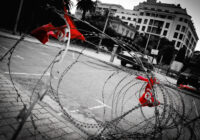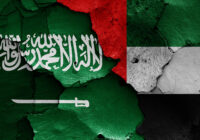Qatar is playing simultaneously on both sides of the global pitch, leaving Westerners unable to decide if it’s a friend or foe.
The record-breaking move of Brazilian football superstar Neymar da Silva Santos Júnior from Barcelona to Paris Saint-Germain likely would not have been possible without the financial support of a tiny Gulf nation under fire for its perceived support of Islamist terrorism: Qatar.
That Qatar is even capable of being a key factor in the No. 1 telenovela of the summer transfer season is why the equally dramatic, but far more significant, geopolitical crisis has been so hard to solve more than 60 days in. The petroleum-rich emirate’s investments in world football rival those its accusers say have been offered to keep Islamist extremist movements alive. And the same state-funded company that owns the Al Jazeera news outlet — a focal point of the political controversy — also controls the beIN Sports network, one of the major global broadcasters of football games.
In the match-up of global politics, Qatar is playing simultaneously on both sides of the pitch, leaving American and other Western officials unable to decide if it’s primarily a friend or foe.
On one hand, there’s the nation that has bankrolled the massive five-year, $500-million transaction that brought one of the world’s best players to Paris and fueled hopes of a UEFA Champions League triumph. It’s the same country that is set to host the 2022 FIFA World Cup as the latest effort to brand itself as a modern Muslim state.
Ownership of PSG by an investment firm linked to Qatar’s ruling al-Thani family is just one of many massive financial bets the tiny nation has made in Western economies to secure the future of its 313,000 citizens, who make up only about 12% of its 2.6 million residents.
Qatar has also made political investments in the West. It’s a full member of the international coalition fighting the Islamic State, and hosts the US military headquarters in the Middle East at Al Udeid Air Base near Doha.
But it’s the other side of the coin that prompted Saudi Arabia, the United Arab Emirates, Bahrain and Egypt to abruptly break off relations on June 5 and impose both a trade and travel ban on Qatar.
At the core of the dispute is Qatar’s support for Islamist movements throughout the Middle East as a means of bolstering its diplomatic influence, primarily the Muslim Brotherhood and its offshoots. Specifically, Qatar stands accused of supporting groups and individuals who pose security threats to the governments aligned against it, along with terrorist movements including Hamas, Hezbollah, the Taliban, al Qaeda and even the Islamic State. Qatar is also accused of violating secret agreements with its neighbors to curb that support.
Doha denies all the allegations and has rejected a list of demands that includes an end to financing of terrorist groups and harboring of individuals seen as linked to terrorism, along with shutting down Al Jazeera, which stands accused of inciting violence throughout the region and of being a mouthpiece for the Brotherhood and other extremists.
 The Saudi-led group has also pushed for Qatar to be stripped of hosting the World Cup, and its media have criticized Doha’s attempt to “politicize” the Neymar move to bolster its image.
The Saudi-led group has also pushed for Qatar to be stripped of hosting the World Cup, and its media have criticized Doha’s attempt to “politicize” the Neymar move to bolster its image.
Much of the evidence offered by Saudi Arabia and its allies echoes that which US officials have offered over the years to bolster their case that Qatar is at the very least not doing enough to curb support for terrorism. In an October 2016 speech, Acting Treasury Undersecretary Adam Szubin said Qatar “still lacks the necessary political will and capacity to effectively enforce their [countering the financing of terrorism] laws against all terrorist financing threats regardless of organization or affiliation.”
But Qatar’s role as a nominal ally and its massive investments in Western economies have given leaders pause to go as far as the Saudi-led group in trying to punish Doha. It’s the source of the confusion in US policy that has President Donald Trump emphatically declaring that Qatar supports terrorism “at a very high level” while his Defense and State Departments work to negotiate a resolution to the crisis.
In much the same manner, many football fans who believe Qatar’s money supports terrorism will watch on beIN Sports as Neymar takes the pitch at the Parc des Princes. And when he does, he’ll be wearing on the front of his jersey a message from PSG’s prime sponsor, the national airline of the UAE: “Fly Emirates.”
The views expressed in this article are the author’s own and do not necessarily reflect Fair Observer’s editorial policy.
Photo Credit: Christian Bertrand / Shutterstock.com
Support Fair Observer
We rely on your support for our independence, diversity and quality.
For more than 10 years, Fair Observer has been free, fair and independent. No billionaire owns us, no advertisers control us. We are a reader-supported nonprofit. Unlike many other publications, we keep our content free for readers regardless of where they live or whether they can afford to pay. We have no paywalls and no ads.
In the post-truth era of fake news, echo chambers and filter bubbles, we publish a plurality of perspectives from around the world. Anyone can publish with us, but everyone goes through a rigorous editorial process. So, you get fact-checked, well-reasoned content instead of noise.
We publish 2,500+ voices from 90+ countries. We also conduct education and training programs
on subjects ranging from digital media and journalism to writing and critical thinking. This
doesn’t come cheap. Servers, editors, trainers and web developers cost
money.
Please consider supporting us on a regular basis as a recurring donor or a
sustaining member.
Will you support FO’s journalism?
We rely on your support for our independence, diversity and quality.






